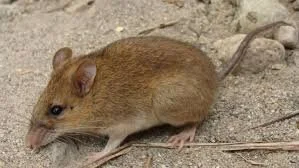Volcano Mouse Once Thought Extinct is Actually 'Doing Great,' Research Finds
By CBC Radio Written by Sheena Goodyear. Interview produced by Sarah Jackson.
Scientists didn’t expect to find critters on Mount Pinatubo after deadly 1991 eruption
The Mount Pinatubo volcano mouse is doing just fine, thank you very much. In fact, it's positively "thriving."
Scientists had presumed the species was wiped off the face of the Earth after a 1991 volcanic eruption destroyed its only habitat on the island of Luzon in the Philippines.
But a team surveying the mountain decades later discovered that several native species managed to survive the eruption — and the most plentiful of those is the resilient little rodent Apomys sacobianus.
"It's doing great, contrary to everything we expected," Eric Rickart, lead author and curator of vertebrates at the Natural History Museum of Utah, told As It Happens host Carol Off.
The findings were published recently in the Philippine Journal of Science.
A deadly and devastating eruption
The eruption of Mount Pinatubo three decades ago was the second-largest volcanic eruption of the century, killing 722 people and leaving another 200,000 homeless, according to the U.S. National Oceanic and Atmospheric Administration.
Lava and ash spewed, crops burned and landslides followed for months, swallowing the old-growth forests that once flourished there.
As far as scientists know, the mountain is the only place in the world where Apomys sacobianus exists, so they figured the critters were gone forever.
Scientists and local Indigenous people braved a dangerous landscape, still very much eroded and prone to landslides, in order to document the animal life on Mount Pinatubo. (Field Museum )
"But the Mount Pinatubo mouse is pretty unique in that it apparently is very highly adapted to disturbance and is thriving in the area, doing very, very well," Rickart said.
"So that's really contrary to everything we would expect from an animal that is — the term is endemic — restricted to a very small area, particularly on an island, a tropical island. Islands are thought to be very delicate ecologically and subject to invasion and subject to disturbance that would greatly alter conditions."
In honour of researcher and late friend
While Rickart is the lead author of the study, he's not the one who conducted the dangerous surveys on Mount Pinatubo that documented the rodent's resiliency.
Those expeditions, carried out in conjunction with Indigenous Aeta people in 2011 and 2012, were led by Rickart's late friend, Danny Balete, a researcher for Chicago's Field Museum.
Balete, his field assistants and the Aeta braved a dangerous landscape — still very much eroded and prone to landslides — in order to document the animal life there. They found evidence of several native species that survived in the volcano's wake, including rodents, deer, bats and pigs.
But the mouse was "far the most abundant animal" they found, Rickart said.
Danny Balete, the researcher who led the fieldwork for a study that rediscovered the Pinatubo volcano mouse, died in 2017. (Field Museum)
It was a surprise. But then when we thought about it — and particularly when we put together the things we knew in general about the kind of environment that has existed during the evolutionary history of all of the animals of the Philippines and the plants as well — it makes sense," Rickart said.
"Even though the 1991 eruption of Pinatubo was absolutely devastating and destroyed most of the forest on the mountain, it was actually very mild, or it was not as intense as previous eruptions that had occurred during the geological history of the mountain. And there were several of them."
Balete died suddenly in 2017 before he could publish what he found on Mount Pinatubo.
"After he died, it was just something we had to pick up and run with, mostly to honour Danny, but also to report what we think is a very encouraging sign that everything isn't just doom and gloom," Rickart said.
"Even something as tragic and catastrophic as a volcanic eruption has a silver lining that it tells us that this animal, in particular the Pinatubo mouse, but also mammals of the Philippines in general, are incredibly resilient in the face of this kind of catastrophe, as are the Filipino people.
"What we hope is that the area will be protected, both to encourage the Aeta and also to encourage forest development over time."
Written by Sheena Goodyear. Interview produced by Sarah Jackson.
Originally Published: https://www.cbc.ca/radio/asithappens/as-it-happens-friday-edition-1.5893813/volcano-mouse-once-thought-extinct-is-actually-doing-great-research-finds-1.5893817









